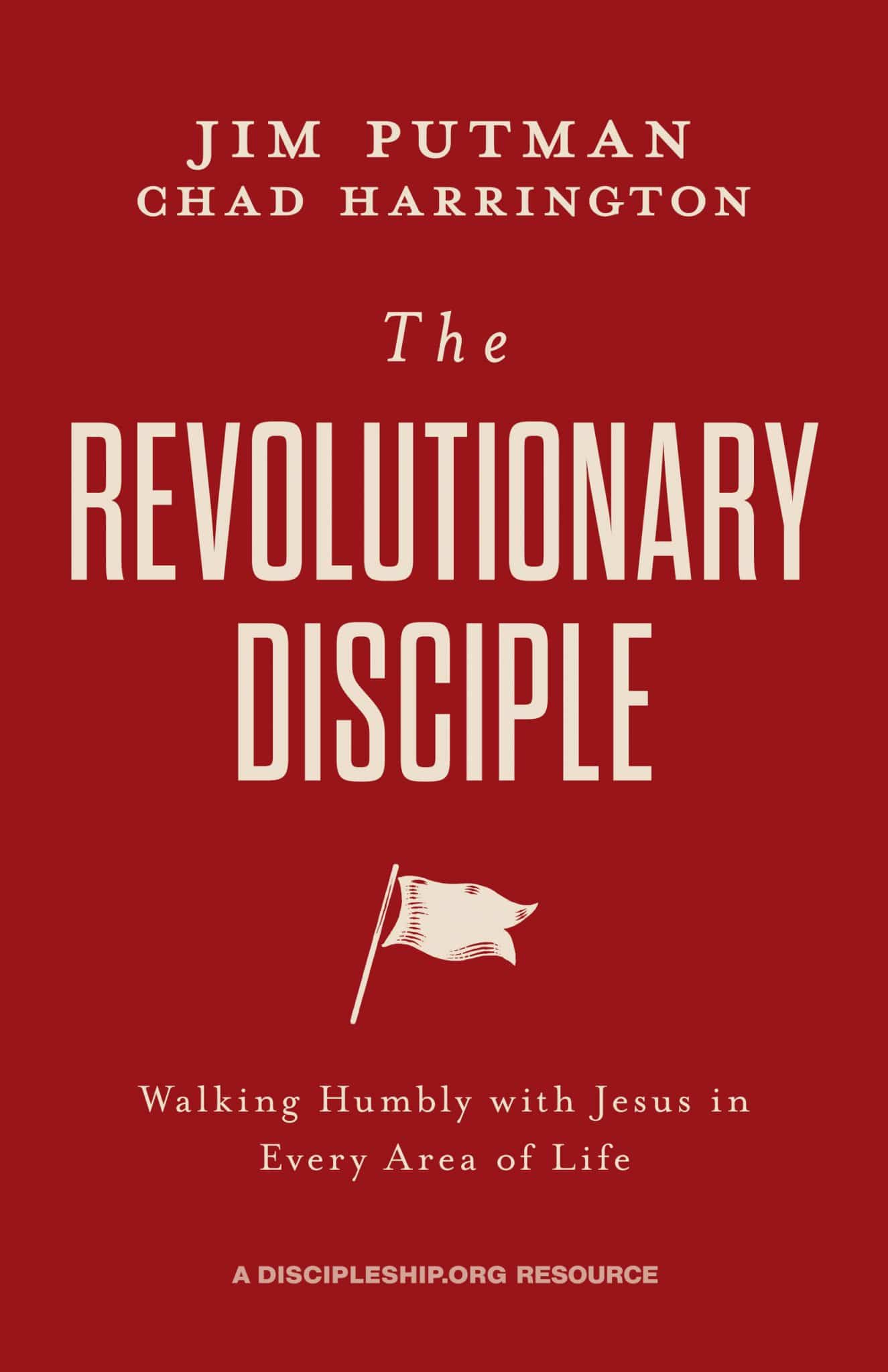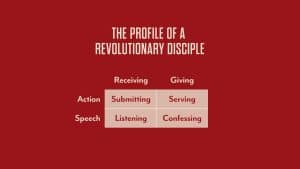Learn to humble yourself through the four core practices of humility in the ways of Jesus: serving, submitting, listening, and confessing.
The following is adapted from Chapter 4 of The Revolutionary Disciple by Jim Putman and Chad Harrington.
If I (Chad) were to stand up and tell you, “I am humble,” you’d likely laugh in my face. And your laughter would say: No way! That’s because no one can boast of their humility and keep it.
Yet God calls us to humble ourselves:
- “If my people, who are called by my name, will humble themselves and pray and seek my face and turn from their wicked ways, then will I hear from heaven and will forgive their sin and will heal their land” (2 Chronicles 7:14).
- “Humble yourselves before the Lord, and he will lift you up” (James 4:10).
- “Humble yourselves, therefore, under God’s mighty hand, that he may lift you up in due time” (1 Peter 5:6).
Plus many other indirect passages in the Bible imply the same sort of lifestyle.
So what do we do? It’s awkward to pursue humility publicly because then we appear proud.
How do we move forward?
When I wrote The Revolutionary Disciple with Jim Putman, we wrestled with this question—a lot.
Then we became completely humble.
Just kidding.
Pride has been and still is a struggle at times for both of us. Yet what Jim and I discovered on the biblical path toward humility, in light of our struggles and victories, is that becoming humbler is possible by the grace of God.
Also, knowing what humility looks like is possible.
Jesus is the ultimate picture of humility.
As we looked in Scripture, especially at the life of Jesus and the teachings about Christ, we uncovered four core practices of humility. Together they comprise the profile of what we call a “revolutionary disciple.”
Allow the following to be an introduction to this thesis, and we’ll let you read the rest of the book to work out the details.

Jim Putman’s The Revolutionary Disciple
Walking Humbly with Jesus in Every Area of Life
A comprehensive discipleship strategy for your home, work, and church. You’ll benefit greatly from reading this book with your discipleship group or church staff.
— Robby Gallaty, pastor and author of Replicate
A long overdue call to us as leaders to humble ourselves before the Lord and the people we lead.
— Ed Litton, pastor and president of the Southern Baptist ConventionGet Product
A humble disciple knows who they are before God and chooses to go lower by serving, submitting, listening, and confessing.
Think of these four actions as the basic rudiments of a humble life, the profile of a revolutionary. They help us march to the beat of Jesus’ drum.
God calls us to engage these actions because they help us navigate the discipleship journey. In fact, we won’t get far without them.
So let’s talk about each of them in turn so we can easily identify them as we walk through the five spheres.
1. Serve
Serving means laying down our desires, preferences, and comforts to physically help others.
I (Jim) was reminded of why serving is so important when I was with a church leadership team at a DiscipleShift training event overseas.
Before I had spent time with the lead pastor, I was impressed by the strong character of those in his ministry. I noticed that everyone “underneath” the lead pastor was totally servant-hearted.
So I asked some of the other leaders why they were such eager servants.
“We teach from the very beginning that leadership is servanthood: servant leadership, servant leadership, servant leadership,” they told me.
But the longer I observed the pastor and other “high-level” leaders, the more I noticed they didn’t actually serve one another, nor did they serve those “below” them either. Wherever the high-level leaders went, they let their team members serve them—even by carrying the leaders’ Bibles!
It became obvious to me that while they had taught servant leadership from the beginning, at some point they ceased to embody servant leadership. Doing menial tasks, such as moving chairs, was beneath them.
It almost seemed as if servant leadership was a stepping stone to true leadership. However:
Only by serving do we prove ourselves to be servant leaders.
My story sounds vaguely similar to what Jesus said about the Pharisees, who loved “the place of honor at banquets and the most important seats in the synagogues” (Matthew 23:6).
Jesus taught his disciples to take the opposite posture and serve because “the greatest among you will be your servant” (Matthew 23:11).
Left to ourselves, we seek accolades. We sometimes move toward seats of honor, thinking we’re doing ourselves a favor, when we’re actually feeding the monster within us. Jesus warned us, “Whoever exalts himself will be humbled, and whoever humbles himself will be exalted” (Matthew 23:12).
Jesus taught we become humble by serving others, but he modeled it too:
After Jesus washed the disciples’ feet, he asked them, “Do you understand what I have done for you? … You call me ‘Teacher’ and ‘Lord,’ and rightly so, for that is what I am. Now that I, your Lord and Teacher, have washed your feet, you also should wash one another’s feet. I have set you an example that you should do as I have done for you” (John 13:12–15).
That’s what humble, relational discipleship looks like. Jesus told his disciples to do what he did for them: the shockingly humble service of cleaning dirty feet.
Notice, again, he told them to do something humble, not merely to think about themselves in a humble way. No matter what position we hold—on a board, on a committee, on a church staff, as an employer, as a coach, etcetera—we never graduate from the humble job of serving others.
How are you at serving others?
If you only lead, teach, and organize and never get your hands dirty, you might have a problem on your hands. Jesus told the Pharisees they lacked integrity because they would “tie up heavy burdens, hard to bear, and lay them on people’s shoulders, but they themselves are not willing to move them with their finger” (Matthew 23:4, ESV).
When we don’t model service as leaders, we set a bad example for anyone watching us. Instead, we can show love by giving others what they need, rather than what we want to give them.
I (Chad) remember what my dad always says: “You can’t teach what you don’t know, you can’t lead where you won’t go, and you can’t give what you can’t show.” There’s no way around it: Humble disciple makers serve others in tangible ways.
If you want to grow here, make it your goal to find ways to serve people.
Serving is an antidote to pride.
It’s the antidote to pride just like giving is an antidote to greed. By serving, you can overcome your selfishness and love people the way Jesus did. So take someone’s plate to the sink, empty out the trash, clean the toilet, set up chairs for a church service, or take the last spot in the food line.
Find ways to serve, especially when no one is looking. Make service a secret act of worship for you. As you follow Jesus in wholehearted service like this, he will teach you humility.
2. Submit
Submitting is coming under the authority of God’s delegated authorities.
As we mentioned, humble disciples also follow Jesus by submitting to authority. Those who submit like Jesus did, however, seem to be fighting an uphill battle in our culture today.
“Submission” has become a bad word because it implies weakness or because those in authority often misuse their power and hurt others. As a result, we attempt to protect ourselves from truly being under anyone’s authority except our own.
We unpack this one more in the spheres chapters of The Revolutionary Disciple.
Let’s pause here because it’s helpful to think of these first two core practices, service and submission, as the two sides of humble action.
We typically serve others by giving them something. We give them a lift, we offer a hand, or we bring them a meal.
Submission, on the other hand, is more about receiving someone’s leadership. Instead of giving through action, we actively receive someone’s authority with our deeds.
Together they comprise humble action.
Humble listening and confessing complete the four core practices of humility as the two sides of humble speech. When we listen to someone speak, we are receiving their words, and when we confess, we are giving our words to someone else.
See how these four practices cover both sides of humble speech and action:
The Profile of a Revolutionary Disciple

Taken together, giving and receiving humble words and deeds make for a humble disciple—a true revolutionary. When it comes to the life of a revolutionary, it doesn’t get more radical than being humble in everything we say and do!
When we live humbly like this, we allow God space to cultivate humility in every area of our lives.
Now let’s unpack the two sides of humble speech.
3. Listen
Listening means seeking the input of others.
Proud people never listen to others, but a humble disciple of Jesus listens.
Even Jesus listened to the Father. He said, “Whatever I say is just what the Father has told me to say” (John 12:50). Jesus was obedient to what he heard from the Father.
So as his disciples, we listen first to God. Scripture says, “The word of God is living and active. Sharper than any double-edged sword” (Hebrews 4:12).
Read Chad Harrington’s article “Hebrews 4:12 Explained: The Piercing Word of God.”
We receive God’s Word, even when it pierces our hearts, and this requires humility. Receiving input from anyone means we recognize our need to learn.
Many Christians can quote the passage that says, “All Scripture is God-breathed and is useful for teaching, rebuking, correcting and training in righteousness” (2 Timothy 3:16). But, unfortunately:
Few Christians are adept at receiving Scripture’s rebuke, correction, and training in righteousness.
Do we love to receive good teaching? Yes! We love more information. But anything that cuts to the heart—not so much. Yet unless we humbly receive the piercing Word of God, we will not be able to progress far on the path of humility.
It starts with God’s Word, but this principle applies just as much to other people’s words to us. Listening to God leads to our being “thoroughly equipped for every good work” (2 Timothy 3:17), and listening to other people generally leads to a humble life.
But we shouldn’t listen to just anyone’s input. We must be shrewd and discerning about who speaks into our lives. Yet if we listen to no one, we have a pride issue.
How well do you receive critiques about your work? What about feedback on your parenting? What if someone offers input about how you lead at church?
Truly listening to others in these areas requires humility (more on this in Chapter 7).
4. Confess
Confessing means freely admitting when we’ve done wrong.
Humble people are not concerned with themselves or how they might appear if they show weakness, so they more naturally confess. This takes two forms: confessing Jesus as Lord and confessing our sins.
Confession starts with confessing Jesus as Lord.
This includes submitting to his power to say what’s right and wrong in our lives. Yet as we follow him, we still miss the mark sometimes. So as his disciples, we confess our weaknesses and our sins too (James 5:16).
For example, we might say something wrong, speak inappropriately to a fellow employee, or gossip. When we fail, we confess it and change—all by his power in us.
As we abide with Christ, the Holy Spirit convicts us. We confess our sin and receive forgiveness (1 John 1:9). Then we also go to those we’ve wronged and ask forgiveness from them.
Here’s an example of confession.
A guy I (Chad) had been discipling for nearly two years started to drift away from our relationship. Eventually, we reached an impasse. I don’t know if I pushed him too hard or if he wasn’t ready to hear what I had to say as I discipled him.
Whatever the case, after two years of regularly meeting together, I could see pride in his life. I owed it to him to address it, so I told him that I thought pride was the number-one issue in his life, and he needed to face this reality in order to grow.
Takes one to know one!
When I would bring it up, though, he got angry and defensive. In fact, one time he got so mad that we had to stop talking on the phone. These conversations didn’t go well.
In the end, I was disappointed and felt like I had failed.
It was a painful experience.
He accepted that things weren’t working between us, and he decided to leave our discipleship group but stay involved in another ministry of our church.
Even as we ended that season of discipleship together, he started showing signs of humility.
He asked what it would look like to grow in humility, so I shared with him the importance of actions like serving and submitting.
A lightbulb went off in his head. But instead of looking like an enlightened disciple, he looked more like a deer in the headlights!
I knew the feeling. I too had been confronted about my pride, and it’s a tough pill to swallow. It feels especially daunting at first.
As we finished our conversation, I feared our relationship was essentially over.
Years later, though, we started hanging out again, and our relationship rekindled! One night we were hanging out on my back porch, and he confessed: “I’m really sorry for how I treated you. I was incredibly ungrateful, and I’m sorry.” Wow!
His confession healed a wound in me.
I had no idea he even remembered or cared about what had happened. God had been working on him to make him humbler, which revealed itself through his confession. Confession does that for all of us.
This example also shows that God was at work in my friend’s life, even when I was not. My friend was meeting with others in the church, and the Holy Spirit continued to form him.
This is such an important lesson: We should always avoid being someone’s sole disciple maker.
Instead, from the beginning, we should make space for other disciple makers. This means that we encourage those we’re discipling to seek counsel from others in the church, learn from other teachers, and spend time developing relationships with those who are older and more mature than them.
This posture models humility and says, “I don’t know everything,” which is a form of confession too.
We know that while Jesus didn’t have any mistakes or any sins to confess, he did deal with human weakness, which he confessed (Hebrews 4:15; Mark 14:34).
For example, he wasn’t afraid to confess his weakness in the garden of Gethsemane. That night, Jesus admitted his soul was grieved to the point of death, and he asked the Father for another way. Then he asked his disciples to join him and pray with him.
If Jesus confessed his weakness and asked for help, then we have plenty to confess.
We can sometimes be afraid to confess our sins or mistakes because we think people will judge us. While that might happen, most of the time confession does the opposite. People trust us more.
Whether preaching, teaching, or just talking with friends, humble people consistently share their struggles. In this way, mature disciples are honest and transparent.
Learning to confess our sins freely helps us also confess our allegiance to Jesus freely. So “confession” means both confessing sin and confessing Christ.
In Chapter 3 of The Revolutionary Disciple, we emphasized the inner life of a humble disciple: someone who knows who they are and makes the choice to act. This inner life combined with these four actions of humility gives us the full picture.
Humility involves the whole person.
It involves our heart, our actions, and our words—and it moves from the inside out. We flesh all this out more in what we called the “spheres chapters” of the book, but for now, remember that we learn the heart of Christ by choosing to serve, submit, listen, and confess.
Moving Forward
If our definition of a humble disciple is right—a humble disciple knows who they are before God and chooses to go lower by serving, submitting, listening, and confessing—then it provides a practical way for pursuing the humility of Christ.
Jesus modeled these core practices to show us how to grow. We aren’t left wondering how to become humble, and we don’t continually have to wince as we ask God to make us humble. These practices help take the mystery away. Becoming humbler is possible!
We will never be flawless in this life, but as students of Jesus, we can become more like our teacher, who was perfectly humble.
Instead of just wandering on the path of discipleship, we can intentionally pursue these actions of Christlike humility and participate with God as he transforms us.
These actions have the power to radically alter our lives—and the world.
From our experience, as you continue following Jesus in these ways, you will increasingly find that his humility becomes your humility. This is the kind of discipleship revolution that God wants.
Read the rest of Jim Putman and Chad Harrington’s book, The Revolutionary Disciple, which is on sale here.

